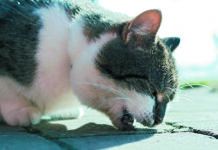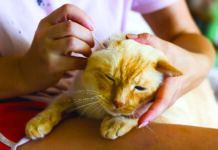[From Tufts January 2012 Issue]
Diarrhea is one of the most common health problems seen in cats and can present a diagnostic and treatment challenge because of its wide variety of possible causes. Infectious diseases, toxins, dietary changes and even emotional upset can result in diarrhea, and determining the cause is often a process of elimination.
“The most likely causes of diarrhea in a given cat depend on his age and lifestyle,” says Michael Stone, DVM, DACVIM, an internal medicine specialist and clinical assistant professor at Cummings School of Veterinary Medicine at Tufts University. “Intestinal parasites such as roundworms typically cause diarrhea in kittens. Indoor/outdoor cats of middle age most commonly get nonspecific diarrhea, which I refer to as ‘getting a bad mouse.’ These non-specific stomach upsets often spontaneously improve within three days.”
Among the common causes of diarrhea are a sudden change in diet; eating inappropriate items; gastrointestinal infections caused by bacteria, viruses or protozoans; food allergy; pancreatitis and inflammatory bowel disease. In older cats, alimentary lymphoma and hyperthyroidism are possible causes. Cats with the feline immunodeficiency virus are prone to diarrhea because their immune systems are suppressed. Other viral diseases such as coronavirus, panleukopenia and feline leukemia virus can also cause the condition. And unsanitary conditions, such as those in overcrowded shelters or poorly maintained catteries, also put cats and kittens at risk for diarrhea.

Young kittens are at risk of dying due to diarrhea
“Diarrhea in kittens can be serious and life threatening, especially in shelters, rescue situations and foster homes,” says Winn Feline Foundation President Vicki Thayer, DVM, a board-certified feline specialist in Lebanon, Oregon. “Fifteen percent of kittens will die or be euthanized because of illness before they reach 8 weeks of age.”
In response to this alarming statistic, the Winn Feline Foundation recently awarded two grants to Jodi L. Gookin, DVM, PhD, an internal medicine specialist and associate professor at North Carolina State University. She will focus on the effects of diarrhea on feline health (see sidebar).
Signs that warrant veterinary care
Not every case of diarrhea warrants a visit to the veterinarian. If the cat has a good appetite, acts normally and has a lifestyle that is conducive to getting diarrhea, such as free access to the outdoors, Dr. Stone says it’s usually safe to wait two or three days to see if the problem resolves on its own.
In cases caused by overeating or consumption of a new or rich food, it may help to withhold food for 12 hours and then feed a highly digestible diet recommended by your veterinarian.
An occasional bout of diarrhea in cats is not uncommon and is usually no cause for concern, adds Arnold Plotnick, DVM, DACVIM, Catnip’s medical editor and owner of Manhattan Cat Specialists in New York City. He cautions, though, that persistent diarrhea is not normal and requires veterinary attention. Left untreated, diarrhea can result in dehydration and electrolyte imbalances.
Older cats may need diagnostic tests to rule out serious diseases, such as intestinal cancer. In addition, any diarrhea that is accompanied by appetite loss, vomiting more than once or twice or listlessness should prompt a trip to your veterinarian. Other causes for concern are a change in the color of the stool, especially if it is unusually dark (indicating the presence of digested blood), if there is straining or other signs of discomfort; and depressed behavior.
If it seems unclear whether your cat should see the veterinarian, give the office a call and describe what’s happening. The history of the problem may determine whether it’s urgent, says Dr. Thayer.

Treatment of diarrhea
The treatment for diarrhea depends on the cause. Infectious forms of diarrhea are usually treated with antimicrobial drugs. If a food allergy is suspected, the veterinarian will recommend a hypoallergenic diet. Inflammatory bowel disease may respond to corticosteroid injections. Probiotics can help with bacterial overgrowth. Diarrhea caused by intestinal cancer may completely resolve with appropriate therapy.
“Simple cases of intestinal parasites may only require routine deworming,” Dr. Plotnick says. “Some cats cannot tolerate a particular brand of food or a particular form of the diet, dry versus canned, for instance. In these cases, switching to a more appropriate diet resolves the problem. Cats with diarrhea for several days may require subcutaneous fluids and anti-diarrheal medications.”
The excitement of a cat show, the anxiety caused by the strange smells in the veterinary clinic or the fear of being chased by visiting children can all trigger loose stools in a cat. Diarrhea resulting from stress usually disappears when the stressful situation is over.
And finally, never give cats anti-diarrhea drugs intended for humans. Many of these medications contain substances that may be dangerous or toxic to your cat. Always consult your veterinarian before giving your cat any medication.




